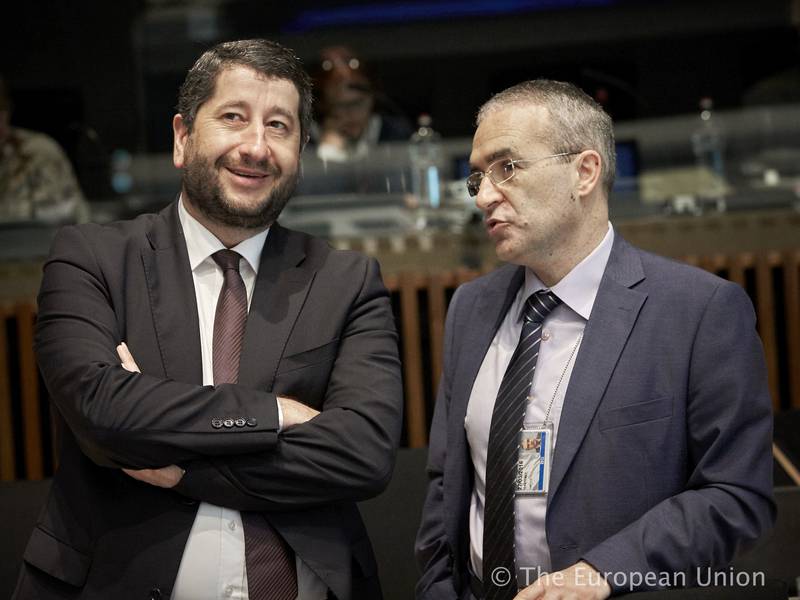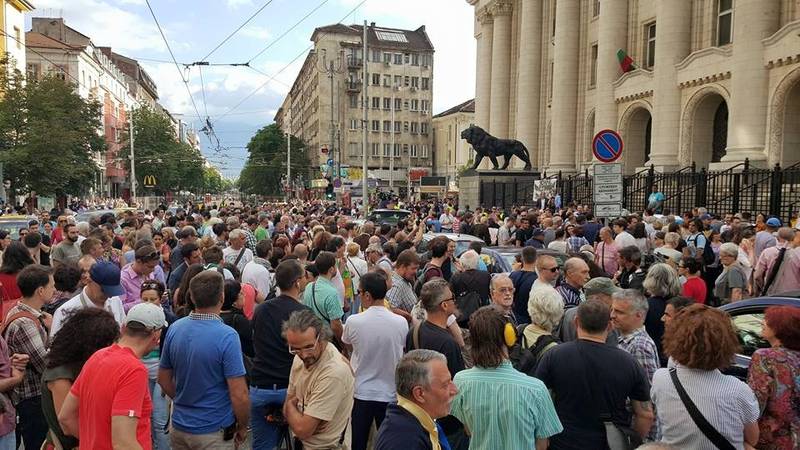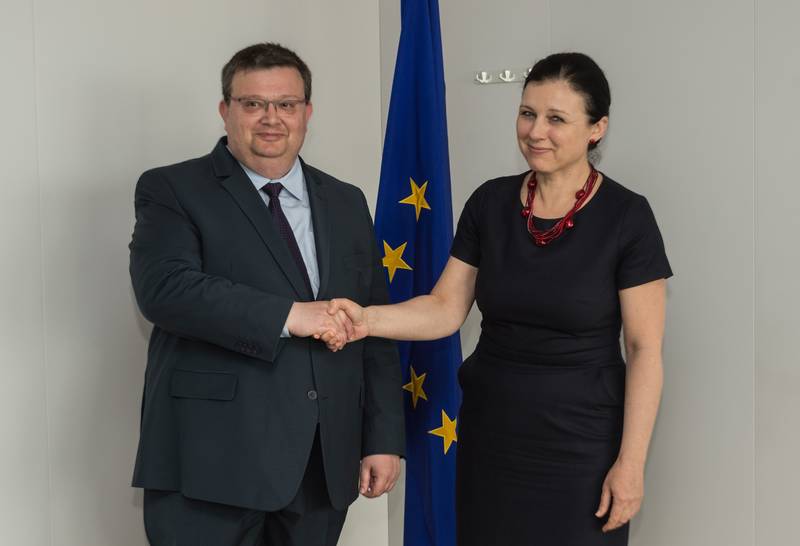Bulgaria in a Bitter Fight for a Reform of the Judiciary. It Needs Help
Adelina Marini, July 20, 2015
 In the midst of the heavy Greek drama the EU has hardly any time and energy for Bulgaria and Romania’s problems with rule of law, that in no way threaten the survival of the Eurozone or the EU. However, what is happening in the two countries at the moment is extremely important. The situation there has significantly changed for the first time since they joined the EU. Romania became a prime example for Bulgarians of fighting corruption at the highest levels of power with the special anti-corruption prosecution laying their hands on the Prime Minister himself. This stimulates their own attempts to end the idleness. Over the past week the EC presented, in a workgroup on the Cooperation and Verification Mechanism (CVM) under which the two countries joined the EU in 2007, their oral report on the two states’ progress in fulfilling the set benchmarks. The group is made up of representatives of the member states and the report is oral and thus not public.
In the midst of the heavy Greek drama the EU has hardly any time and energy for Bulgaria and Romania’s problems with rule of law, that in no way threaten the survival of the Eurozone or the EU. However, what is happening in the two countries at the moment is extremely important. The situation there has significantly changed for the first time since they joined the EU. Romania became a prime example for Bulgarians of fighting corruption at the highest levels of power with the special anti-corruption prosecution laying their hands on the Prime Minister himself. This stimulates their own attempts to end the idleness. Over the past week the EC presented, in a workgroup on the Cooperation and Verification Mechanism (CVM) under which the two countries joined the EU in 2007, their oral report on the two states’ progress in fulfilling the set benchmarks. The group is made up of representatives of the member states and the report is oral and thus not public.
According to euinside’s source, the evaluations of Bulgaria and Romania were noticeably different. Some member states even confirmed what has been the talk in Brussels for a long time now that Romania’s positive effort could lead to it coming out of the CVM, followed by entering Schengen. This is very bad news for Bulgaria who is yet to start the battle with corruption. Moreover, while the EC showers praises over Romania for its decisive fulfilment of the CVM benchmarks, Bulgaria is only commended for the latest approved strategy on fight against corruption and judicial system reform. The EC noted in the workgroup very slow progress in the investigations of high-level corruption, finding that they end at the judicial phase. Besides, a lack of capacity for the investigation of such cases is noted in the prosecution.
The spirit of the oral report coincides to a great degree with the atmosphere that prevailed at the first of its kind hearing of the two states on their efforts on the CVM in the European Parliament’s Committee on Budgetary Control several months ago as euinside reported in detail.
Citizens have taken matters in their own hands
Nine years after joining the EU there is a change in the EC’s assessment of the fulfilment of the obligations, taken by Sofia, and it is a negative one. The reports become worse and more blunt every time. Last year, the EC directly stated that the judiciary is under political pressure. The new Commission, led by Jean-Claude Juncker, tempered down the tone considerably but the major findings remain – there is no change. Bulgaria is not fulfilling the agreed requirements, and the promise for their fulfilment was the condition for accession of the country to the EU on January 1, 2007.
There is, however, some change. It came from the civil society which started to demand the start of reforms. The energy for this appeared after the 2013 protests, when tens of thousands of Bulgarians came out to protest against the insolent proposal that one of the most controversial figures in Bulgaria’s latest history heads the most powerful agency in the country the State Agency for National Security (DANS). The protests had instantaneous effect. The nomination was withdrawn but the most active protesters found the moment exceptionally right to ask for more, namely change of the model of inequality under the law. This proved to be the most difficult task for the oligarchy model, which makes the judiciary’s dependencies so heavy and hard to overcome, retaliated by all means possible.
 As a result of the 2013 protests a semi-old semi-new government came to power. Semi-old because it is headed by Boyko Borisov, who was in power when the EC kept noting deterioration in its reports on the CVM. Semi-new because reformatory forces entered it and Parliament. Among them is Minister of Justice Hristo Ivanov. At the very start of his term in office he presented to Parliament another strategy for judiciary reform. The debates on the strategy showed from the start that it is going to be a difficult and long battle. The document got accepted, probably because it does not require any commitment.
As a result of the 2013 protests a semi-old semi-new government came to power. Semi-old because it is headed by Boyko Borisov, who was in power when the EC kept noting deterioration in its reports on the CVM. Semi-new because reformatory forces entered it and Parliament. Among them is Minister of Justice Hristo Ivanov. At the very start of his term in office he presented to Parliament another strategy for judiciary reform. The debates on the strategy showed from the start that it is going to be a difficult and long battle. The document got accepted, probably because it does not require any commitment.
Work on it started, however, when the Ministry of Justice presented to Parliament a bill for changes in the Constitution that attempt to guarantee judiciary independence and the creation of the necessary environment for real fight against corruption and organised crime. While the Ministry was drafting the bill and bargaining was going on in Parliament for who will back it, civil society came active again. The initiative “Justice for all” was created, which invited the former Minister of Justice of Romania and currently MEP Monica Macovei (EPP). She is the pioneer of the current institutional environment in Romania, which claims so many victories against political corruption. At their own expense the initiative organised a discussion with Ms Macovei and invited Minister of Justice Hristo Ivanov to attend. Her visit made the Romanian MEP a celebrity in Bulgaria. She sent a strong message to the country’s political class by stating you need just one person in power to start the reform.
The bill for Constitutional changes, applauded by both the European Commission and the member countries, is already in Parliament but it is causing sharp resistance reactions. It provides for separating the Supreme Judicial Council in two parts – judges and prosecutors association. The term in office of the members is shortened from five to four years and they are granted the possibility to make suggestions for hiring and dismissing the Attorney General. There is no resistance voiced in Parliament to the reform in principle, however one of the influential groups – DPS (ALDE) asked for the changes to be voted after the municipal elections this autumn. President Rosen Plevneliev stated, however, that the reform must be finished with no delay.
“I am working for the judiciary reform happening now. It must not be postponed for September and October. It must not be postponed until after the elections. The judiciary reform is strategically important to Bulgaria. If it does not happen there will be fewer investments, less economic growth, and we will once more slow down on the road to our prosperity", said the President, quoted by the Bulgarian National Radio. Meanwhile, the “Justice for all” initiative is having meetings with the leaders of political parties in Parliament to vouch its support for the judiciary reform and its resistance to postponing it, or brokering political deals for voting it in. The initiative also organised a protest against the Attorney General this week.
Where are the European political parties?
At the moment there is strong momentum and realistic conditions for the re-launch of the judiciary reform that has been frozen for nine years. Apart from the presence of civil pressure and the “one person in power to start the reform” some outside help is necessary. According to a euinside diplomatic source, the current Commission favours meeker speech and softer approach. This was very evident in Mr Juncker’s promise to Bulgarian authorities that the CVM would end by the end of his term (2019). Monica Macovei and other MEPs are of the opinion the CVM should stay in place until it accomplishes its goals. And this cannot happen without the involvement of the European political families. They should encourage their members in Bulgaria to work for this accomplishment, as well as  applying pressure in the European Parliament. In Bulgaria the gathering of 180 Members of Parliament out of 240 is needed to pass Constitution changes.
applying pressure in the European Parliament. In Bulgaria the gathering of 180 Members of Parliament out of 240 is needed to pass Constitution changes.
In the motives of the bill the Ministry of Justice states that conducting a judiciary reform “is a prerequisite to overcoming the systematic deficits in the Bulgarian Constitutional democracy”. This is why all large European political families must put pressure on their Bulgarian members. GERB (EPP) and BSP (PES) have not stated expressly a denial of support but are not doing what is necessary to push through the reform. Only DPS (ALDE) has stated they are not going to be present in plenary at the vote. euinside sent an official request for comment on the subject to ALDE but have received no reply at the time of ending of this text. German newspaper Frankfurter Allgemeine Zeitung commented last week that despite its notable example of battling corruption Romania might lose this battle for the Romanian Parliament, which is accused by the EC for impeding reforms, is preparing changes in the Criminal Code and the Criminal Procedure Code that would make pressing charges against corrupt politicians more difficult.
“The summer is hot and the EU is too focused on its own problems to worry about the situation in Romania. If the planned reforms go through, however, the fight against corruption in Romania will be a lost cause”, writes the newspaper. And this will encourage the resistance forces against the reforms in Bulgaria. That is why it is very important the EU finds the time and pays attention to both the countries through every possible channel – Commission, Parliament, Council. If the reformatory momentum is lost it may never come back. At least not in the foreseeable future. At the end of the day this, too, is one of the EU’s own troubles.
Translated by Stanimir Stoev
 Entrance to the Berlaymont building | © EC - Audiovisual Service
Entrance to the Berlaymont building | © EC - Audiovisual Service | © European Union 2020, EC - Audiovisual Service
| © European Union 2020, EC - Audiovisual Service Commission President Ursula von der Leyen | © European Union 2019 - Source: EP
Commission President Ursula von der Leyen | © European Union 2019 - Source: EP